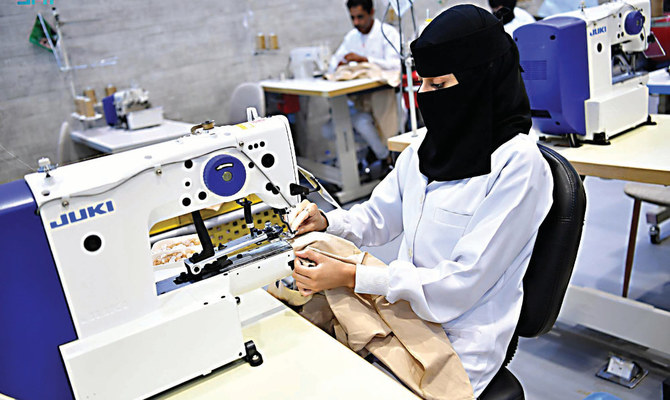Saudi Arabia leading the way when it comes to getting women into work

RIYADH: No country in the world has been able to keep up with Saudi Arabia’s remarkable strides in female labor force participation, a top executive at the World Bank has claimed.
Speaking to Arab News, Safaa El-Kogali flagged that the share of women in the Kingdom’s workforce now stands at 36 percent – up from just over 17 percent in 2017.
The country director for the Gulf Cooperation Council at the World Bank attributed the rise to factors within the Vision 2030 initiative aimed at diversifying the Saudi economy away from oil.
“No country was able to achieve growth in female labor force participation at this rate,” El-Kogali said.
“I think the train has already left the station when it comes to women’s labor market participation in the Kingdom of Saudi Arabia. I think the changes that were done are structural and the reforms that were put in place, whether they’re legal reforms, or policies, are there now,” she added.
El-Kogali also emphasized that there have been legal code reforms that remove specific challenges for women.
These legal reforms contributed to a broader shift in societal perceptions and norms regarding the significance of female participation in the labor market.
According to a World Bank report released on Nov. 22 that focused on women’s labor force participation in the Gulf region, the impact of the COVID-19 pandemic on Saudi Arabia “created a positive demand shock” which “accelerated” the number of women in work.
“For the rest of the GCC and MENA (Middle East and North Africa) region, important lessons can be drawn on advancing female labor force participation,” the report said.
El-Kogali pointed out the important role education is playing in ensuring women are able to meet the demand in the Kingdom’s fast developing economy.
“When I say the train has left the station, I see the shift in social norms and perceptions. I used to come to Saudi Arabia a few years ago and coming now I see the changes just visibly as I walk around Riyadh,” she continued.
Overall, the private sector workforce in Saudi Arabia has experienced consistent growth, reaching 2.6 million in the early months of 2023, according to the World Bank report.
This expansion aligns with broader trends of increased participation in the labor force, a higher employment-to-population ratio, and a reduction in unemployment rates.
The structural changes introduced through Vision 2030 include policy reforms removing challenges for women, providing increased workplace protection, and the introduction of programs supporting females in their careers.
“Many impediments for women to work were removed. At the same time, new protections, like the right to equal pay, and many new programs to support women in the workforce were implemented including, labor law reforms to eliminate discrimination in employment, sexual harassment in the workplace,” El-Kogali commented.
She added: “Together with a change in social norms about women working, which was very much facilitated by government communication and awareness campaigns, these changes resulted in this extraordinary expansion of female labor force participation among Saudi women.”
The World Bank also revealed trajectories regarding the GCC’s economic growth, forecasting it to grow by 3.6 percent in 2024 and 3.7 percent in 2025.
This will come after a 1 percent growth in 2023, with the weaker performance driven primarily by lower oil sector activities reflecting successive production cuts by the Organization of the Petroleum Exporting Countries and its allies, known as OPEC+, and the global economic slowdown.
According to the report, the Kingdom’s overall gross domestic product will show a contraction of 0.5 percent in 2023 before reporting a recovery of 4.1 percent in 2024 to reflect expansions of the oil and non-oil sectors.
“The region performed strongly in 2022 with an average growth that surpassed 7 percent, led mostly by Saudi Arabia, which is the biggest economy in the GCC and it’s also globally the fastest growing large economy,” El-Kogali said.
“This growth is not just due to buoyant hydrocarbon prices, but also a continued growth of the non-oil sectors, and the latter was the result of persistent structural reforms undertaken by several of the GCC countries, of course, including Saudi Arabia,” she continued.
El-Kogali was clear that the transformations observed in recent years, particularly in the willingness of Saudi women to engage in employment, are not temporary but enduring.
“The change is visible across all age groups – it is not only young Saudi women who are now more willing to take up work, but also their mothers,” she said.
She added: “Important lessons for other MENA countries can be drawn, and we as the World Bank will share the Kingdom’s experience in this important area with other countries who are trying to implement similar reforms.”
Culled from Arab News

